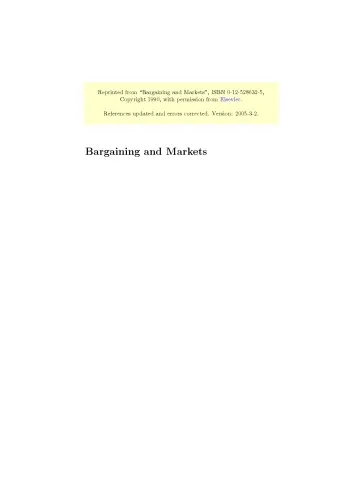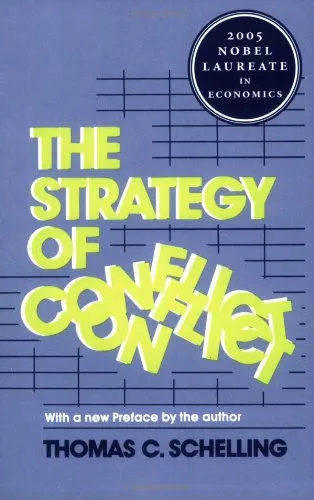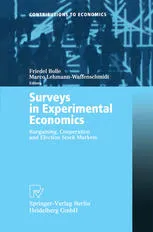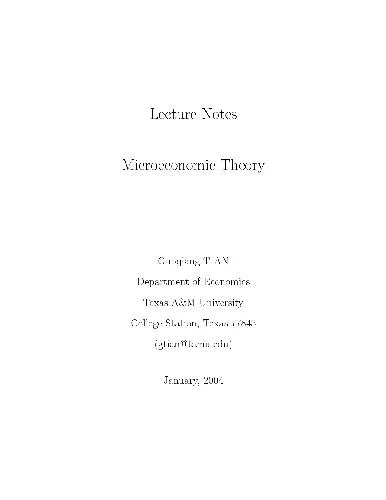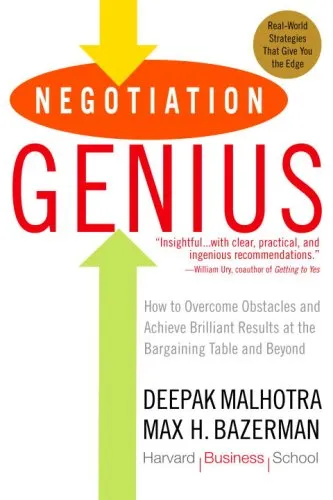Bargaining and Markets (Economic Theory, Econometrics, and Mathematical Economics )
4.5
Reviews from our users

You Can Ask your questions from this book's AI after Login
Each download or ask from book AI costs 2 points. To earn more free points, please visit the Points Guide Page and complete some valuable actions.Related Refrences:
Introduction
Welcome to "Bargaining and Markets," an illuminating exploration of the intricate dynamics that govern negotiation processes and market interactions. Authored by Martin J. Osborne and Ariel Rubinstein, this book is a cornerstone resource for anyone interested in economic theory, econometrics, and mathematical economics.
Our aim in writing this book was to unify the literature on bargaining and market theory, presenting a user-friendly guide to understanding these complex topics. Whether you are a student, researcher, or practitioner in economics, this book offers essential insights into the mechanisms that drive economic behavior and decision-making.
Detailed Summary of the Book
The book is structured to offer an in-depth analysis of bargaining scenarios and market structures. It begins by laying the foundational theories of bargaining, including the Nash bargaining solution and the Rubinstein bargaining model. By delving into the mathematical underpinnings of these models, readers gain a thorough understanding of the axiomatic approach to bargaining.
As you progress, the book transitions into market structures, exploring the characteristics and outcomes of different market interactions. Topics such as equilibrium concepts in bargaining, cooperative versus non-cooperative bargaining scenarios, and the role of information in determining bargaining power are thoroughly examined.
The latter sections integrate these insights with market theory, discussing how bargaining affects market outcomes, pricing mechanisms, and the distribution of resources. The comprehensive analysis extends to various applications of bargaining and market theory in real-world situations, illustrating the practical relevance of theoretical constructs.
Key Takeaways
- Understanding the foundational models of bargaining and their practical implications.
- The significance of information asymmetry and strategic behavior in bargaining scenarios.
- Insights into the role of bargaining in shaping market outcomes and dynamics.
- Exploring the mathematical foundations of bargaining theories to better predict and explain economic phenomena.
- The critical examination of cooperative versus non-cooperative interaction models in economics.
Famous Quotes from the Book
"Bargaining is not just about reaching an agreement, but negotiating the balance of power and benefits between parties."
"In markets, as in bargaining, information is a currency as powerful as money itself."
Why This Book Matters
This book is an essential read for those seeking to grasp the complexities of economic interactions. By offering a comprehensive and accessible analysis of bargaining and market dynamics, it serves as a critical tool for understanding the negotiation landscape across various contexts—be it business, trade, or interpersonal negotiations. Its scientifically rigorous approach ensures that readers are equipped with both the theoretical knowledge and practical insights needed to analyze and engage effectively in bargaining and market activities.
Furthermore, "Bargaining and Markets" translates complex mathematical theories into manageable concepts, making it an invaluable resource for both academic pursuits and real-world application. Whether you are an economist aiming to specialize in game theory or a professional looking to improve negotiation strategies, this book provides the tools and insights needed to succeed.
Free Direct Download
You Can Download this book after Login
Accessing books through legal platforms and public libraries not only supports the rights of authors and publishers but also contributes to the sustainability of reading culture. Before downloading, please take a moment to consider these options.
Find this book on other platforms:
WorldCat helps you find books in libraries worldwide.
See ratings, reviews, and discussions on Goodreads.
Find and buy rare or used books on AbeBooks.
1444
بازدید4.5
امتیاز0
نظر98%
رضایتReviews:
4.5
Based on 0 users review
Questions & Answers
Ask questions about this book or help others by answering
No questions yet. Be the first to ask!
